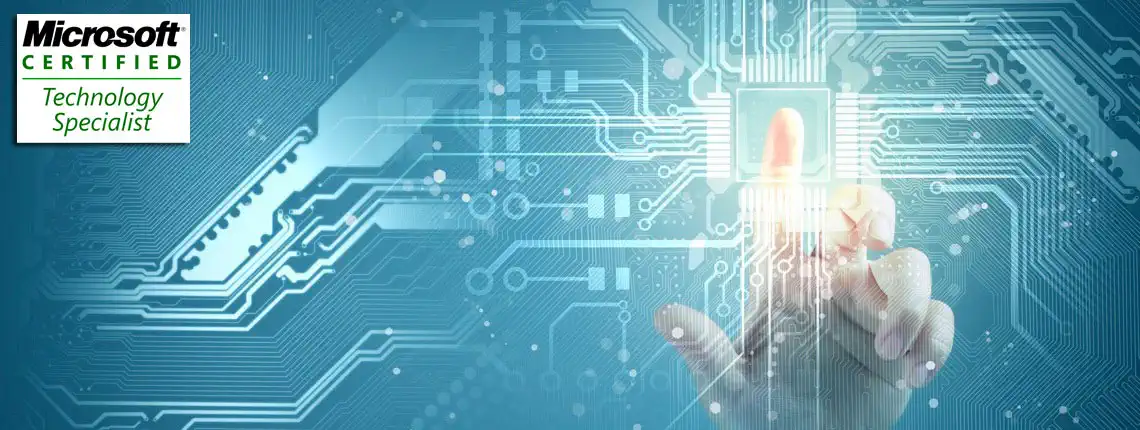 |
 |

Microsoft is a preeminent vendor of IT services and is present in almost all computing environment. MCSA (Microsoft Certified Solutions Associate) is an accreditation issued by Microsoft for those who want to secure an entry level position in IT industry. This certification is considered as an industrial standard for estimating the capability of an individual to work in IT environment. Nowadays most of the companies prefer certified professionals and they are ready to train their staffs to acquire these certifications. Basically it is a beginner level proficiency confirmation and hence is prerequisite for higher level mastery.
MCSA is beginner level exam and it is valid all over the world. An MCSA certified professional validates his skills in managing, installing, and configuring, Microsoft systems and services. This certification does not have validity and hence you don’t want renew it.
MCSA have certification in different disciplines like MCSA Windows Server 2016, MCSA Windows Server 2012, MCSA Windows 10, MCSA SQL Server 2012/2014 etc. Each contains two or three levels of exam. To acquire a certification in MCSA Windows Server 2012, one needs to clear the following exams
Those who want it a career in the IT, in reputed organizations can join this course. It does not require any specific qualification. Any fresher for working professional can undergo this course. We can assist you to gain the certification with our comprehensive training classes. If you have passion and interest in IT, then we can help you to improve your knowledge and skills.
Most of the organisations have a Microsoft working environment and hence there is a huge demand for professionals in microsoft. MCSA always adds value to your resume. This certification course enables you to manage servers comfortably. A certified professional can apply for the following posts:
Trinity Technologies, the top rated IT training institute in Trivandrum, offers MCSA training with advanced lab features. We aim at job oriented training with hands on experience in servers. In our training process, we start from very basics to advanced concepts, so that every student could grasp the contents well.
Our specialties:
| Week Days | 07:00 AM | 06:00 PM |
| Week End | 08:00 AM | 06:30 PM |
MCSA Windows Server 2016
This course is developed for IT professionals who need to design, plan, implement, manage and support Microsoft Windows 2016 networks or who plan to take the related MCSE and MCSA exams. The training will be given by Senior System/Network engineers with several years of field experience.
Installation, Storage, and Compute with Windows Server 2016 - (Exam :70-740)
Course Outline
1. Installing, upgrading, and migrating servers and workloads
Introducing Windows Server 2016
Preparing and installing Nano Server and Server Core
Preparing for upgrades and migrations
Migrating server roles and workloads
Windows Server activation models
2. Configuring local storage
Managing disks in Windows Server
Managing volumes in Windows Server
3. Implementing enterprise storage solutions
Overview of DAS, NAS, and SANs
Comparing Fibre Channel, iSCSI, and Fibre Channel over Ethernet
Understanding iSNS, DCB, and MPIO
Configuring sharing in Windows Server 2016
4. Implementing Storage Spaces and Data Deduplication
Implementing Storage Spaces
Managing Storage Spaces
Implementing Data Deduplication
5. Installing and configuring Hyper-V and virtual machines
Overview of Hyper-V
Installing Hyper-V
Configuring storage on Hyper-V host servers
Configuring networking on Hyper-V host servers
Configuring Hyper-V virtual machines
Managing virtual machines
6. Deploying and managing Windows and Hyper-V containers
Overview of containers in Windows Server 2016
Deploying Windows Server and Hyper-V containers
Installing, configuring, and managing containers by using Docker
7. Overview of high availability and disaster recovery
Defining levels of availability
Planning high availability and disaster recovery solutions with Hyper-V virtual machines Backing up and restoring by using Windows Server Backup
High availability with failover clustering in Windows Server 2016
8. Implementing failover clustering
Planning a failover cluster
Creating and configuring a new failover cluster
Maintaining a failover cluster
Troubleshooting a failover cluster
Implementing site high availability with stretch clustering
9. Implementing failover clustering with Windows Server 2016 Hyper-V Overview of the integration of Hyper-V Server 2016 with failover clustering Implementing Hyper-V VMs on failover clusters
Key features for VMs in a clustered environment
10. Implementing Network Load Balancing
Overview of NLB
Configuring an NLB cluster
Planning an NLB implementation
11. Creating and managing deployment images
Introduction to deployment images
Creating and managing deployment images by using MDT
Virtual machine environments for different workloads
12. Managing, monitoring, and maintaining virtual machine installations WSUS overview and deployment options
Update management process with WSUS
Overview of Windows PowerShell DSC
Overview of Windows Server 2016 monitoring tools
Using Performance Monitor
Monitoring event logs
Networking with Windows Server 2016 - (Exam: 70-741)
Course Outline
1. Planning and implementing an IPv4 network
Planning IPv4 addressing
Configuring an IPv4 host
Managing and troubleshooting IPv4 network connectivity
2. Implementing DHCP
Overview of the DHCP server role
Deploying DHCP
Managing and troubleshooting DHCP
3. Implementing IPv6
Overview of IPv6 addressing
Configuring an IPv6 host
Implementing IPv6 and IPv4 coexistence
Transitioning from IPv4 to IPv6
4. Implementing DNS
Implementing DNS servers
Configuring zones in DNS
Configuring name resolution between DNS zones
Configuring DNS integration with Active Directory Domain Services (AD DS) Configuring advanced DNS settings
5. Implementing and managing IPAM
Overview of IPAM
Deploying IPAM
Managing IP address spaces by using IPAM
6. Remote access in Windows Server 2016
Overview of remote access
Implementing the Web Application Proxy
7. Implementing Direct Access
Overview of DirectAccess
Implementing DirectAccess by using the Getting Started Wizard Implementing and managing an advanced DirectAccess infrastructure
8. Implementing VPNs
Planning VPNs
Implementing VPNs
9. Implementing networking for branch offices
Networking features and considerations for branch offices Implementing Distributed File System (DFS) for branch offices Implementing BranchCache for branch offices
10. Configuring advanced networking features
Overview of high performance networking features Configuring advanced Microsoft Hyper-V networking features 11. Implementing Software Defined Networking
Overview of SDN.
Implementing network virtualization
Implementing Network Controller
Identity with Windows Server 2016 - (Exam: 70-742)
Course Outline
1. Installing and configuring domain controllers
Overview of AD DS
Overview of AD DS domain controllers
Deploying a domain controller
2. Managing objects in AD DS
Managing user accounts
Managing groups in AD DS
Managing computer objects in AD DS
Using Windows PowerShell for AD DS administration
Implementing and managing OUs
3. Advanced AD DS infrastructure management
Overview of advanced AD DS deployments
Deploying a distributed AD DS environment
Configuring AD DS trusts
4. Implementing and administering AD DS sites and replication Overview of AD DS replication
Configuring AD DS sites
Configuring and monitoring AD DS replication
5. Implementing Group Policy
Introducing Group Policy
Implementing and administering GPOs
Group Policy scope and Group Policy processing
Troubleshooting the application of GPOs
6. Managing user settings with Group Policy
Implementing administrative templates
Configuring Folder Redirection, software installation, and scripts Configuring Group Policy preferences
7. Securing Active Directory Domain Services
Securing domain controllers
Implementing account security
Implementing audit authentication
Configuring managed service accounts
8. Deploying and managing AD CS
Deploying CAs
Administering CAs
Troubleshooting and maintaining CAs
9. Deploying and managing certificates
Deploying and managing certificate templates
Managing certificate deployment, revocation, and recovery
Using certificates in a business environment
Implementing and managing smart cards
10. Implementing and administering AD FS
Overview of AD FS
AD FS requirements and planning
Deploying and configuring AD FS
Overview of Web Application Proxy
11. Implementing and administering AD RMS
Overview of AD RMS
Deploying and managing an AD RMS infrastructure
Configuring AD RMS content protection
Configure AD RMS content protection.
12. Implementing AD DS synchronization with Microsoft Azure AD
Planning and preparing for directory synchronization
Implementing directory synchronization by using Azure AD Connect
Managing identities with directory synchronization
13. Monitoring, managing, and recovering AD DS
Monitoring AD DS
Managing the Active Directory database
Active Directory backup and recovery options for AD DS and other identity and access solutions